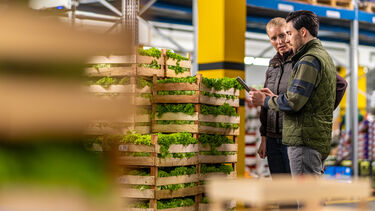Resilient net zero agri-food supply chains
Our researchers are investigating how net carbon emissions can be reduced and resilience introduced from primary production through processing and distribution.

The agri-food sector faces decisions about reducing its carbon footprint to achieve net zero while maintaining food supplies of sufficient nutritional value and at scale to feed the world’s population amidst socio-economic, political, and environmental challenges. The cluster within the Institute for Sustainable Food aims to investigate, through new research and the synthesis of existing studies, how net carbon emissions can be reduced and resilience introduced from primary production through processing and distribution.
The cluster focuses on the UK agri-food sector within a global context and encompasses
livestock and arable farming, as well as the horticultural sector, through three thematic areas:
1. The Production Sector
a) Crop Science (this will include changes in crop genetics to enhance yields through
increased photosynthesis and water use efficiency, reducing dependency on fertiliser
and other agrochemicals, increasing carbon sequestration in plants and soil, and
increasing plant resilience to pathogens and environmental extremes)
b) Farming Practices (this will include on-farm energy generation and use, alternatives
to inorganic fertiliser, slurry management, changes to farm practices to improve soil
health and increase carbon storage, and methodologies to reduce Greenhouse Gas (GHG) production from crop soils and livestock)
2. The Processing Sector
(Including maximising efficiencies through data sharing, waste reduction and
management, and packaging reduction)
3. Retail and Distribution
(including shelf-life extension, Just-in-Time and inventory management, supplier
relations, and traceability).
Cross-cutting work packages explore holistic insights into whole supply chains, energy
management to reduce GHG emissions, and ways to build resilience across the agri-food sector’s activities. The research emphasizes specific real-world supply chains, obtaining and analysing granular data, and using modelling to generate evidence for policy formulation.
The aim of the cluster is to bring together a range of diverse skills and expertise from within the University of Sheffield and beyond to develop this research area and secure external funding. Several key figures in the UK agri-food sector, who have served as advisors to the Management School and Grantham Centre, have already shown interest along with a major UK retailer and the local farm Our Cow Molly.
The Cluster is co-led by Dr Richard Bruce (Management School) and Professor Julie Gray (School of Biosciences) with an advisory group including Professor Peter Horton FRS (School of Biosciences) and Nobel Laureate Sir Rich Roberts FRS (New England Biolabs).


